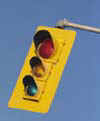Property values
Commentary by Andy Sennitt, 31 March 2005
 A dispute
between a Dutch IT consultant and the BBC has drawn attention to one of the
big problems on the Internet: the protection of copyright.
A dispute
between a Dutch IT consultant and the BBC has drawn attention to one of the
big problems on the Internet: the protection of copyright.
Hendrik Noorderhaven set up a website that searches the BBC's teletext service Ceefax, which used to be freely available in the Netherlands, but was replaced with a very limited service when the Dutch cable companies started receiving BBC1 and BBC2 via digital satellite. Mr Noorderhaven says he isn't making any money from the service - it's a free site and doesn't carry any advertising - but the BBC argues that it's a breach of copyright.
The Financial Times reports that the BBC is planning to take legal action. Mr Noorderhaven says he informed the Corporation when he set up the service, but never received a reply. So he was surprised to read about the BBC's reaction in the Financial Times, but believes it will open an important debate about how the consumer accesses content in the future. It also highlights general confusion about what is and is not allowed on the Internet. Part of the problem is that a lot of existing rules and regulations have not been updated to specifically include websites.
Doing what comes naturally
At Radio Netherlands, we sometimes receive very polite requests for
permission to use material from our radio programmes and website. These
usually come from organisations that are experienced in dealing with the use
of other peoples' material, and they're following the same procedures they
have always followed.
 But
since the Internet was started, millions of ordinary people with no
experience of copyright law or authors' rights suddenly find themselves with
access to material that they can copy and paste on to another website or
mailing list.
But
since the Internet was started, millions of ordinary people with no
experience of copyright law or authors' rights suddenly find themselves with
access to material that they can copy and paste on to another website or
mailing list.
Often, probably not intentionally, the source of the material is omitted, and we have come across material produced here at Radio Netherlands that is credited to someone we've never heard of, presumably the person who copied and pasted the material.
In general, while such things are irritating to the creator of the original item, no great harm is done. We are not a commercial organisation, so we're not losing money because our material appears somewhere else. But if you take the case of Mr Noorderhaven, you have an IT specialist using someone else's material in a way that wasn't intended, and without a licence.
The ability to search the teletext pages rapidly is something that's not available from the BBC's own website - if it was, there would have been no need for Mr Noorderhaven to set up his own site. It seems to me that there's a chance here for the two parties to come to an amicable arrangement, and for Mr Noorderhaven to provide the BBC with the source code so that it can offer the facility as part of its own online service.
Stolen goods
But there's also another way in which other peoples' material is
sometimes used, and in my opinion it's far more serious. There are some
websites, containing information produced by third parties on a
non-commercial basis, that charge people for access. So they're taking
something they got for nothing, without permission, and offering it to
subscribers. The person or organisation that produced the content receives
nothing, and may not even be aware that the material is being used, while
the site that has lifted the material stands to benefit financially from it.
If the Internet were a market, the police could be called in to charge
someone with handling stolen goods.
 At
the moment, the onus is on the originating website to protect itself by
including clear guidelines about what is and is not allowed to be done with
its content. In the course of my work researching media news, I encounter a
huge range of different guidelines, ranging from full reproduction allowed
with credit to no reproduction under any circumstances. I think it's time
that a grading system was introduced rather like the one used for movies,
where a prominently displayed symbol immediately tells the reader what he or
she can and cannot do with the material on the site. The website owner would
be responsible for deciding which category the site should have.
At
the moment, the onus is on the originating website to protect itself by
including clear guidelines about what is and is not allowed to be done with
its content. In the course of my work researching media news, I encounter a
huge range of different guidelines, ranging from full reproduction allowed
with credit to no reproduction under any circumstances. I think it's time
that a grading system was introduced rather like the one used for movies,
where a prominently displayed symbol immediately tells the reader what he or
she can and cannot do with the material on the site. The website owner would
be responsible for deciding which category the site should have.
Creative Commons
One organisation that is attempting to bring some clarity to the
issue of copyright on the Web is Creative Commons. Unfortunately the
organisation's own website was down when I was researching this article. But
Wikipedia says that "The Creative Commons website enables copyright
holders to grant some of their rights to the public while retaining others,
through a variety of licensing and contract schemes, which may include
dedication to the public domain or open content licensing terms.
The intention is to avoid the problems which current copyright laws create for the sharing of information." This initiative is to be applauded, and could form the basis for such a grading system, but it needs a higher profile. I have to admit that I had not come across it until a Radio Netherlands colleague told me about it.
 I
am not in favour of over-regulation, but the ordinary Internet user needs to
be aware of whether a particular site contains information that can be used
elsewhere. I believe the vast majority of Web users would welcome clarity on
this issue. Of course, no system is perfect and there will always be some
cases where the ownership of content is in dispute. But most people are
law-abiding by nature, and would not knowingly misuse information they get
on the Web. So they need some help to understand what is and is not allowed.
Perhaps the BBC vs Noorderhaven case might help to provide some answers.
I
am not in favour of over-regulation, but the ordinary Internet user needs to
be aware of whether a particular site contains information that can be used
elsewhere. I believe the vast majority of Web users would welcome clarity on
this issue. Of course, no system is perfect and there will always be some
cases where the ownership of content is in dispute. But most people are
law-abiding by nature, and would not knowingly misuse information they get
on the Web. So they need some help to understand what is and is not allowed.
Perhaps the BBC vs Noorderhaven case might help to provide some answers.
Disclaimer: The views expressed in this article are the personal views of the author, and do not necessarily represent the opinions of Radio Netherlands.
© Radio Nederland Wereldomroep, all rights reserved ![]()